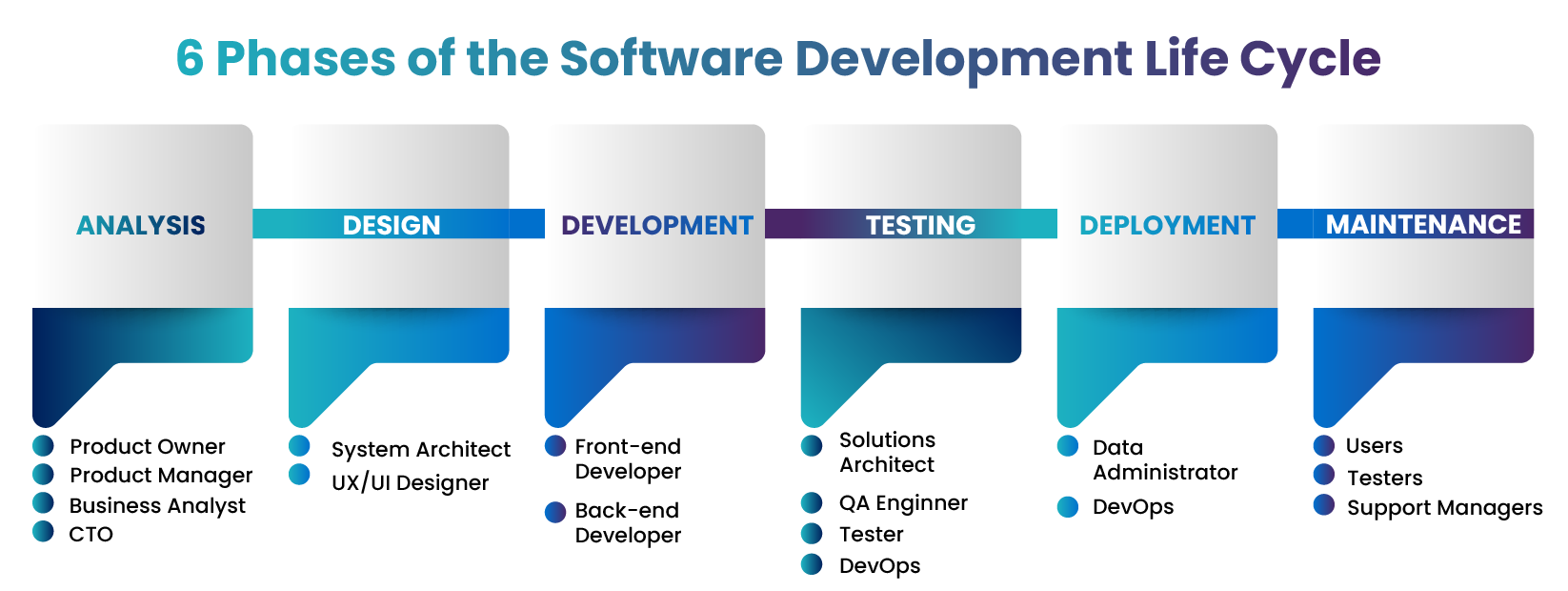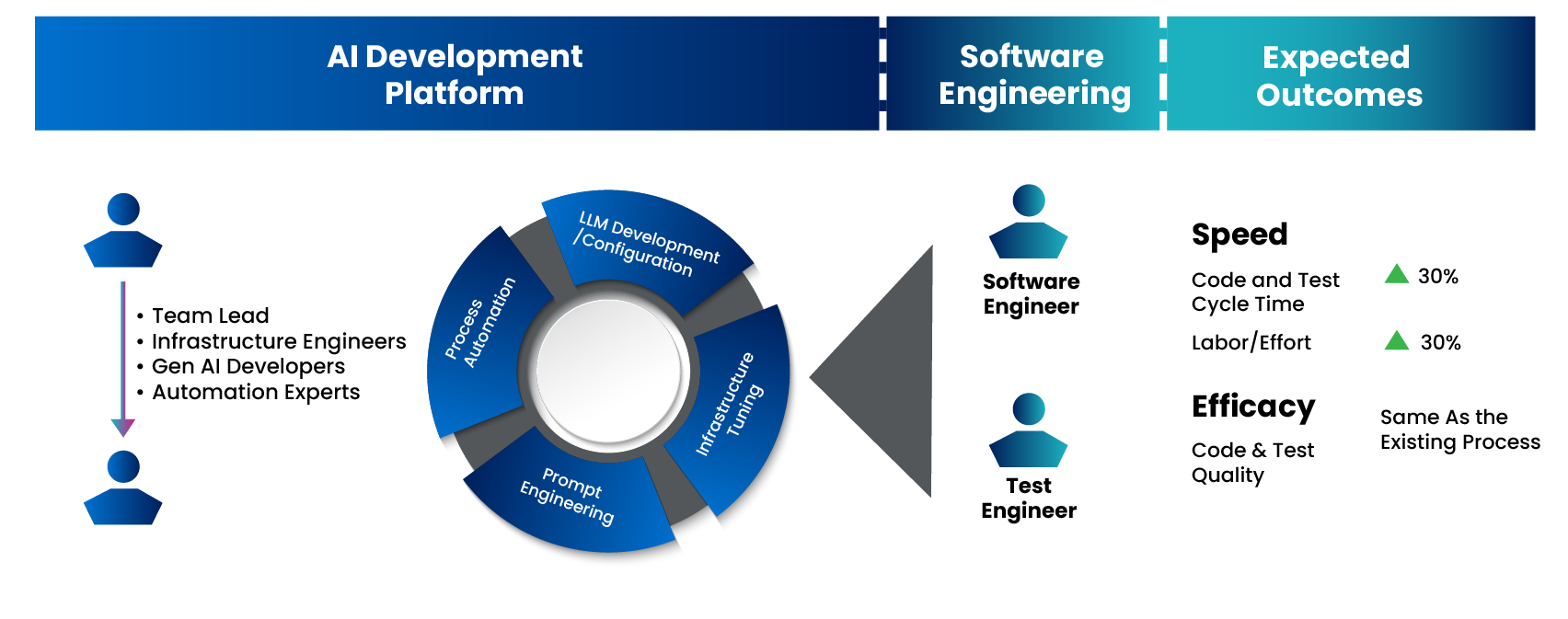Revolutionizing Software Development: AI’s Role in Accelerating Quality, Efficiency, and Innovation
March 28, 2024
Integrating artificial intelligence (AI) into digital product engineering marks a transformative shift in software development, streamlining processes from testing to automated code generation. With AI’s potential to automate complex tasks, increase accuracy, and expedite development cycles—quality assurance and coding practices are fundamentally changing. By harnessing AI, developers and engineers can now address and rectify potential issues earlier in the software development life cycle (SDLC) while generating code with unparalleled efficiency and sophistication, thus driving innovation and efficiency across various industries.
Transforming the Telecommunications Sector
AI’s integration into the software development process in the telecommunications sector heralds a new era of opportunities and advancements. This sector, which is leading the way in implementing technologies such as 5G and fiber broadband, can benefit significantly from AI-driven development practices. AI can accelerate the development of new services, ensuring they’re launched more rapidly and with higher reliability and performance. As telecom companies navigate the complex process of migrating from legacy systems, AI assists in streamlining these transitions, minimizing disruptions, and reducing operational costs. Furthermore, AI-enhanced customer self-service tools are revolutionizing customer experiences by providing more personalized, efficient, and intuitive interactions, thereby reducing service costs. Automating repetitive tasks within the development cycle through AI can significantly reduce cycle times, allowing telecom companies to focus on innovation and delivering high-quality services. The SDLC, powered by AI, is transforming software development in telecom, leading to faster service rollouts, enhanced customer satisfaction, and more efficient operational processes.
Traditional Software Development & Quality Assurance Challenges
Traditional software development and quality assurance methodologies often result in significant time expenditure, primarily due to manual, error-prone processes. Manual testing and code reviews, essential as they are, extend the development cycle and delay market entry for new software products. Developers spend extensive hours writing and executing test cases, then reviewing code to pinpoint defects or optimization opportunities. This approach slows development and shifts focus from innovation to issue remediation, which can be costly in a competitive market where speed and agility are crucial. The growing acknowledgment of these inefficiencies has spurred a move towards more streamlined, technology-driven methods, marking a transformative phase in digital product engineering led by AI advancements.
The Role of AI in the SDLC
Artificial Intelligence is at the forefront of transforming the SDLC, making it more efficient and effective. AI-driven tools and technologies enable automated code reviews, rapid test creation, and intelligent testing, facilitating early detection of potential issues and insights into the optimal allocation of resources. AI algorithms can analyze vast amounts of data from previous projects to predict outcomes, identify risk areas, and suggest improvements, allowing for proactive decision-making and continuous optimization of the development process.
Hurdles in Incorporating AI into the SDLC
Integrating AI into software development processes poses considerable challenges, primarily due to the technical complexity and substantial data requirements of AI models. These models necessitate vast amounts of diverse, high-quality data for training, a resource that is not always readily available, particularly for new or niche projects with limited historical data. Preparing this data for AI applications is also a daunting task, requiring extensive cleaning, labeling, and validation to ensure its relevance and quality, which can be both time-consuming and resource-intensive. Additionally, the current workforce often lacks the necessary combination of software engineering, data science, and AI technology skills, making effective AI deployment a significant hurdle. This talent gap necessitates substantial investment in training or recruiting, which can be costly and time-consuming. Moreover, integrating AI tools into existing development and testing workflows can be challenging, as it may disrupt well-established processes and necessitate ensuring compatibility with existing software stacks. Despite these hurdles, the successful adoption of AI technologies can significantly enhance efficiency, software quality, and development speed—offering predictive insights for more informed decision-making and providing a competitive edge in a market that values speed, quality, and innovation.
Proposed Team Configuration

Innova Solutions: Accelerating the SDLC
Innova Solutions is pioneering a transformative approach in software development by harnessing the power of artificial intelligence to refine and accelerate the SDLC. Through the strategic deployment and meticulous customization of large language models (LLMs), Innova crafts AI-driven solutions tailored to each client’s unique challenges and objectives. This nuanced application of AI extends beyond mere automation, delving into process optimization, infrastructure tuning, and prompt engineering. By automating the mundane and repetitive tasks that often bog down the development process, we allow engineering teams to focus on the more innovative and intricate aspects of software creation.
Innova ensures that the technological environment surrounding artificial intelligence tools is optimized to ensure peak performance. Our objective is to improve and amplify the effectiveness and scalability of AI tools by fine-tuning hardware and software environments. With prompt engineering, Innova refines the interaction between human developers and AI, crafting prompts that yield the most accurate, relevant, and valuable outputs. This careful tuning and configuration of AI tools result in a seamless integration into the existing development workflows, making AI not just an adjunct tool but a core component of the development process.
Innova’s approach to integrating artificial intelligence (AI) into software development goes beyond enhancing efficiency through the shift-left methodology; it fundamentally reimagines the potential of software creation and maintenance. By leveraging AI for automated code generation and sophisticated testing, Innova not only accelerates development cycles and improves reliability at reduced costs but also enables companies to shift from reacting to market demands to leading with innovation. This strategic AI integration empowers the creation of groundbreaking products that set new benchmarks in quality and user satisfaction.
Our team boasts a diverse skill set encompassing many areas, including system administration, GPU configuration, installation & configuration of LLMs, and infrastructure as code. In addition, we possess experience in generative AI applications and prompt engineering, utilizing various automation tools that our clients are using to deliver exceptional results. The anticipated outcomes of deploying these capabilities under our team’s guidance are notably ambitious. Expected results include a 30- 70% reduction in cycle time and labor/effort for case generation, maintaining the automation and error detection level as per the existing process. This strategic approach aims to enhance the testing process’s efficiency while maintaining outcomes, ensuring that the transition to this advanced SDLC is smooth and beneficial.
Catalyzing Digital Transformation
Integrating AI into the SDLC represents a paradigm shift in digital product engineering, offering unprecedented opportunities for efficiency, quality, and innovation. With its expertise in AI and software development, Innova Solutions is ideally positioned to help organizations navigate this transformation, ensuring that they can maximize the benefits of this approach and achieve their digital transformation goals. Through the strategic use of AI, Innova Solutions is not just shifting the software development cycle left; it’s propelling it forward into a new era of digital excellence.
Key Contributor: Varun Yeturi Technical Content Writer





